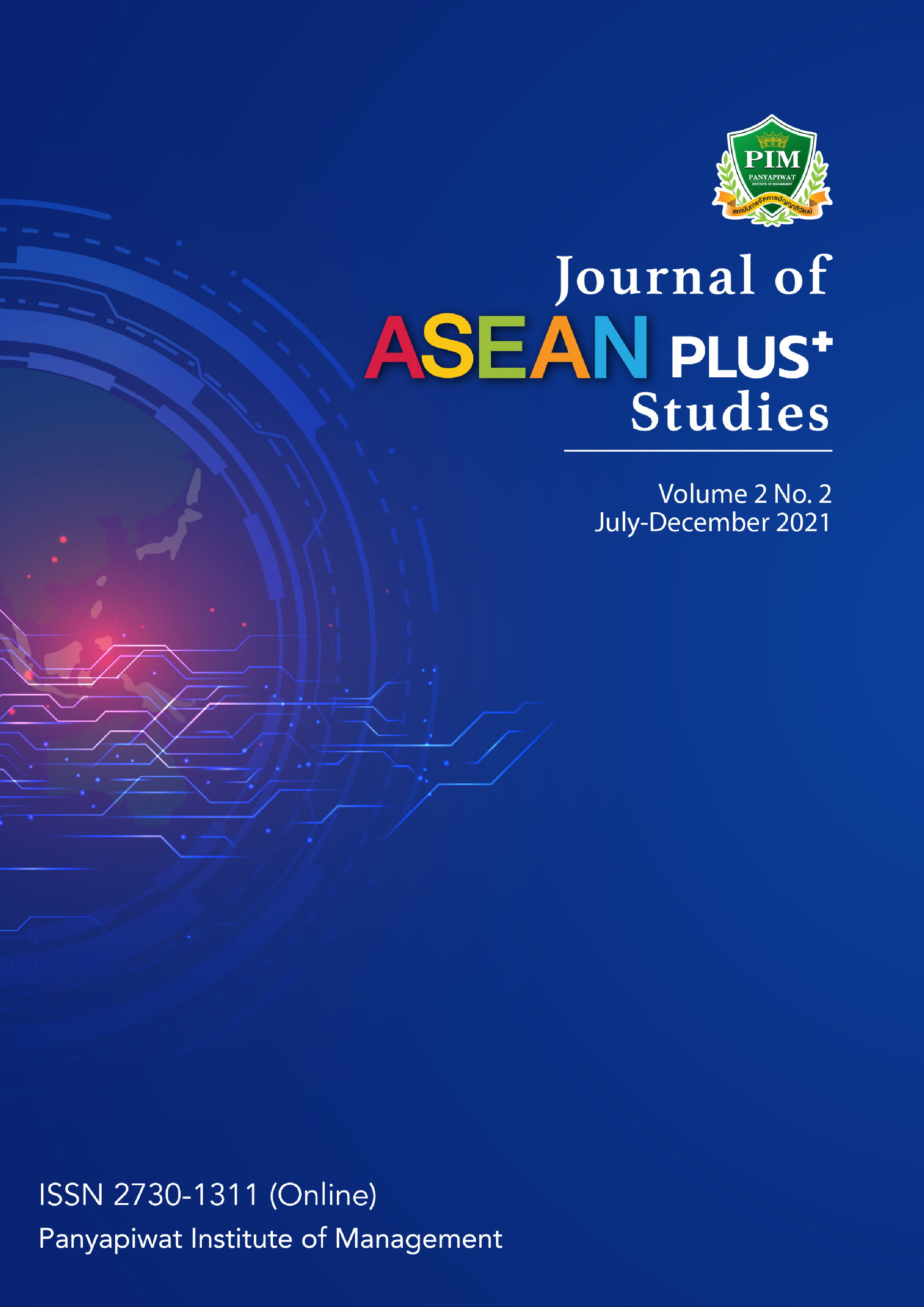Experiential Learning Behavior for Adaptation ASEAN Economic and Social Changes after the COVID-19 Crisis
Keywords:
Experiential Learning Behavior, ASEAN Economy, Society COVID-19Abstract
This article describes the importance of ASEAN socio-economic transformation after the COVID-19 crisis. It was pointed to the direct impact on the educational system transforming to online learning and was to study the learning style that is appropriate to the current situation to accommodate future changes using experiential learning theory as the study basis, which is a learning style suitable for adaptation of learners and presents a guideline for the joint development of ASEAN. The application model of Kolb’s experiential learning cycle based on the Constructivist Theory concept for adaptation to ASEAN socio-economic changes after the COVID-19 crisis. In this paper, it serves as a universal model that can be applied to education at all levels and cultures as saying that education is a measure of the country’s development. Therefore, the study of the model to support experiential learning behavior in the future in order to support that change is the foundation for the joint economic and social development of the ASEAN Community. It creates a competitive advantage and defines the role of the region on the global stage.
References
Bartle, E. (2015). Experiential Learning: An Overview. Retrieved February 7, 2018, from https://itali.uq.edu.
au/filething/get/1860/Experiential_learning_overview_Final_16_Mar_15.pdf
BBC News. (2021). COVID-19: World Bank Cuts Thai GDP to 1%, Indicating Slower than Expected Economic Recovery. Retrieved November 30, 2021, from https://www.bbc.com/thai/thailand-58716458
Daniel, S. J. (2020). Education and the COVID-19 Pandemic. Prospects, 49, 91-96.
FAO, UNICEF, WFP, GRC, ASEAN, and ECHO. (2021). Policy Brief: Developing Shock Responsive Social Protection Systems to Mitigate the Impact of COVID-19, Facilitate Speedy Recovery and Strengthen the Resilience of Vulnerable People in ASEAN. Retrieved November 27, 2021, from https://doi.org/10.4060/cb3206en
Heng, K. (2021). Exploring the Impacts of COVID-19 on Education in Southeast Asia: Challenges and Opportunities. Retrieved November 27, 2021, from https://shorturl.asia/UEQiy
International Labour Organization. (2021). COVID-19 and the ASEAN Labour Market: Impact and Policy Response. Retrieved November 27, 2021, from https://www.ilo.org/asia/issue-briefs/WCMS_816432/lang--en/index.htm
Kimura, F. (2020). Subregional Development Strategy in ASEAN after COVID-19: Inclusiveness and Sustainability in the Mekong Subregion (Mekong 2030). Jakarta, IDN: ERIA.
McLeod, S. A. (2013). Kolb - Learning Styles. Retrieved September 12, 2021, from www.simplypsychology.
org/learning-kolb.html
Morgan, P. J., & Trinh, L. Q. (2021). Impacts of COVID-19 on Households in ASEAN Countries and Their Implications for Human Capital Development. Retrieved October 12, 2021, from https://www.
adb.org/publication/imacts-covid-19-households-asean-countries
Mughal, F., & Zafar, A. (2011). Experiential Learning from a Constructivist Perspective: Reconceptualizing the Kolbian Cycle. International Journal of Learning & Development, 1(2), 27-37.
Nettasana, R. (2020). Lessons Learned on Dealing with COVID-19 of ASEAN Member Countries. Retrieved November 27, 2021, from https://shorturl.asia/pqRTd
OECD. (2020). The Impact of COVID-19 on Education - Insights from Education at a Glance 2020. Retrieved November 27, 2021, from https://www.oecd.org/education/the-impact-of-covid-19-on-education-insights-education-at-a-glance-2020.pdf
OECD. (2021). COVID-19 Crisis Response in ASEAN Member States. Retrieved November 27, 2021, from https://www.org/coronavirus/policy-responses/covid-19-crisis- response-in-asean-member-atates-02f828a/
Paudel, P. (2021). Online Education: Benefits, Challenges and Strategies during and after COVID-19 in Higher Education. International Journal on Studies in Education (IJonSE), 3(2), 70-85.
The Association of Southeast Asian Nations. (2020). ASEAN Education Sector Charts Way Forward Post-COVID-19. Retrieved November 28, 2021, from https://asean.org/asean-education-sector-charts-way-forward-post-covid-19/
The Association of Southeast Asian Nations. (2020). Terms of Reference The COVID-19 Asean Response Fund. Retrieved November 27, 2021, from https://shorturl.asia/9Hv3x
Von Bertalnffy, L. (1968). General System Theory: Foundations, Development, Applications (rev. ed.). New York, USA: George Braziller.






